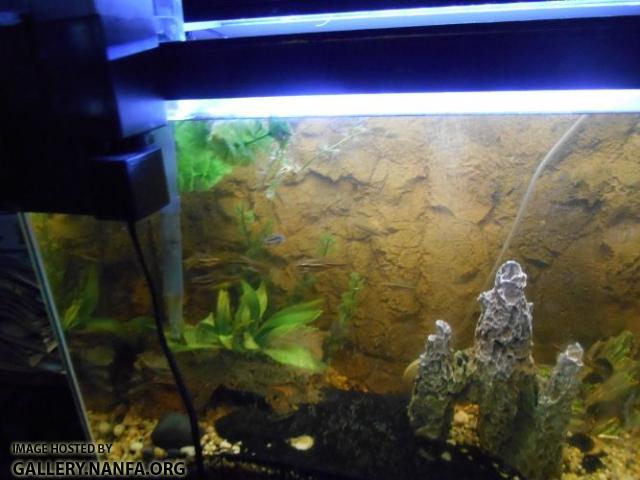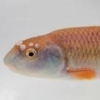Post Convention Crash
#1
 Guest_FirstChAoS_*
Guest_FirstChAoS_*
Posted 16 June 2014 - 12:23 AM
Then yesterday before bed I noticed the discoloration looked a bit darker and the fish huddled at the top in a corner. I feared the tank was going to succumb to "Angry Mormons first law" but being tired I thought I'd take care of it today. I got up today to a massive die off. Only 3 dace, a sucker, and a darter or two left in it. I did a ten gallon water change in hopes of it helping, the water is clearer now but the dace still huddle at the top in the corner.
Is it going to recover any? should I change more water? Should I also change my 55 (which is not showing symptoms yet) just to be safe?
#2

Posted 16 June 2014 - 06:02 AM
I would also to a similar water change in the 55 since there is likely to be some stress to the system there as well.
So that might help the problem, but we should also look at the root cause. Ask your self these questions...
How many fish did you have in each tank before the convention in each tank? How many did you add to each?
What is your filtration, substrate, plants (all things that can help your tank process fish waste)?
This might help you and us understand what happened.
#3
 Guest_mikez_*
Guest_mikez_*
Posted 16 June 2014 - 06:23 AM
I'm curious what medication you added and what criteria did you use when you decided to choose that product.
Also wondering if you made preperations at home anticipating adding fish before you went on your trip.
#4
 Guest_Irate Mormon_*
Guest_Irate Mormon_*
Posted 17 June 2014 - 09:10 PM
Oh, and the first law still applies
#5
 Guest_James_*
Guest_James_*
Posted 18 June 2014 - 01:25 PM
#6
 Guest_FirstChAoS_*
Guest_FirstChAoS_*
Posted 19 June 2014 - 12:45 AM
yes Josh, I think you should do a 10-15 gallon water change in your smaller tank. I don't know how many fish you had and how many new ones you introduced, but its possible that you overloaded your biological filter with too many fish at once.
I would also to a similar water change in the 55 since there is likely to be some stress to the system there as well.
So that might help the problem, but we should also look at the root cause. Ask your self these questions...
How many fish did you have in each tank before the convention in each tank? How many did you add to each?
What is your filtration, substrate, plants (all things that can help your tank process fish waste)?
This might help you and us understand what happened.
The 28 (or 29, or whatever) was empty. A year ago it seemed to have a leak (ended up the aerator) so it was out of commission until the weekend before the convention. I added a few new things (LED lights with 2 color enhance and one white bulb, a foam background). I added the old substrate it had before (a mix of large and small aquariun gravel). And added water and decoration.
After the convention I added a school of minnows, a couple darters, and a couple suckers. I also added aquarium sand for the suckers digestion. The medicine I added was tetracycline as it is supposed to be good for fin rot (which one stoneroller in the 55 had). I did another bucket of water changes the other day as more fish died (was down to one dace, one darter, and one sucker but found a couple more dead the day after I missed when cleaning it bthe day before) I still have the dace. The darter just hides so I will have to look for him to see if he is ok, I see the other two.
This brings up a couple questions. 1. Can a tank stored dry go out of cycle? It was almost out a year. the only other time a tank of mine went dry was for a couple weeks and had no issues when rehydrated. 2. Can the medicine be to blame, or maybe the new lights or background?
I tend to agree, if there are signs of an incipient massive die off, an IMMEDIATE and LARGE water change is in order. By large I mean the fishes' backs are out of the water. You keep aged water on hand, yes?
Oh, and the first law still appliesNow, what is the second law??
First law is "They're all going to die" second law is "An unknown sunfish is always a green". What I do not know is if this means greens will die.
#7
 Guest_Skipjack_*
Guest_Skipjack_*
Posted 19 June 2014 - 03:46 AM
I don't think your tank was cycled. Beneficial bacteria die without food, and water. You have to cultivate the bacteria under the right circumstances. Next convention, put a sponge filter in each one of your existing tanks a month before. Set up your new tank to let the water age. Bring home new fish, and transfer the sponge filters into the new tank. Problem solved. Feed the other tanks lightly for a week or two to let the filtration catch back up, since you took the sponges out, and do several frequent water changes.
#8
 Guest_steve_*
Guest_steve_*
Posted 19 June 2014 - 03:50 AM
1. Can a tank stored dry go out of cycle? It was almost out a year.
Yes, The bacteria in the filter media need to stay wet and have a food source to stay alive.
Skipjack, Oops, I was thinking while you were answering, Took me longer to do one sentence than it did for you to do a paragraph.LOL
#9
 Guest_Skipjack_*
Guest_Skipjack_*
Posted 19 June 2014 - 04:16 AM
#10
 Guest_Skipjack_*
Guest_Skipjack_*
Posted 19 June 2014 - 04:30 AM
Next time talk to Mike Lucas more about it, I am sure he would love to help you out on transporting and introducing new fish. After all, there is no sense in taking home "dead" fish. Give him a call.
#11
 Guest_mikez_*
Guest_mikez_*
Posted 19 June 2014 - 06:21 AM
I my case it was a colony of fancy guppies I had made provisions with a local shop in advance for. Not sure I'd have anything to bring home so didn't set tanks up. I did however add another HOB to the two already there, left guppies in place and went on my trip.
Got home, guppies went in bucket, new fish in well filtered tank and I got a cool tee shirt for my efforts besides.
Point is, plan ahead for the filtration and always add more where possible.
No question antibiotics kill bacteria, no question killing bacteria in your filter is catastrophic. That's not me being ornery, just common sense.
Never, ever, ever hurt the good bugs . THE most important rule of fish husbandry, bar none. Master that, all your troubles go away.
#12
 Guest_Irate Mormon_*
Guest_Irate Mormon_*
Posted 21 June 2014 - 01:12 AM
First law is "They're all going to die" second law is "An unknown sunfish is always a green". What I do not know is if this means greens will die.
Excellent, Grasshopper! In answer to your question, you can't kill greens. Even the white line of death won't kill them. And for the record, the second law must be attributed to Bruce Stallsmith.
Now, what were we talking about?
#13
 Guest_FirstChAoS_*
Guest_FirstChAoS_*
Posted 24 June 2014 - 01:45 AM
This leads to a new issue, after a week of scooping dead fish and doing water changes the mountain redbelly is TERRIFIED of me.
I wonder if, so soon after die offs, I should dare adding new minnows to the tank to try and calm him or hold off for a bit or wait longer after so many deaths.
Here is a picture of what I lost. Alot of lovely fish gone.

#14
 Guest_mikez_*
Guest_mikez_*
Posted 24 June 2014 - 06:40 AM
You need to be nursing the filter back to health, not the fish. Everything should be devoted towards fixing hurt filter and adding extra more filtration. Any fish at this point are sacrificial and are only there to provide food for the good bugs in the filter as it regrows.
By that standard, sure, add a couple hardy bait minnows. As the good bugs bloom, they need more food. Just don't use fragile or valuable or sentimental fish. It'll be awhile till, the bug colony is stable and ammonia and nitrite both subside.
I's you, I'd add two more of those HOB filters, toss the silly ceramic media and the carbon and use all foam blocks. Max out media for good bugs, then nurture them. They are the key to success. Treat your filter like a live creature, or colony of creatures, sensitive to conditions and badly affected by many medicines and chemicals sold in pet shops.
PS. No tank with fish is OK with "no filter" for a couple months, in my opinion.
#15
 Guest_FirstChAoS_*
Guest_FirstChAoS_*
Posted 24 June 2014 - 12:34 PM
Then their are the weak and flimsy ones involved in fish tank cycling.
2 user(s) are reading this topic
0 members, 2 guests, 0 anonymous users









